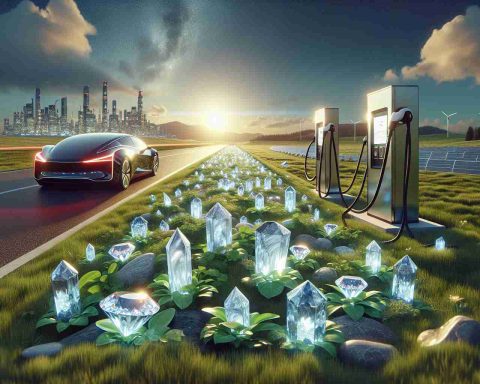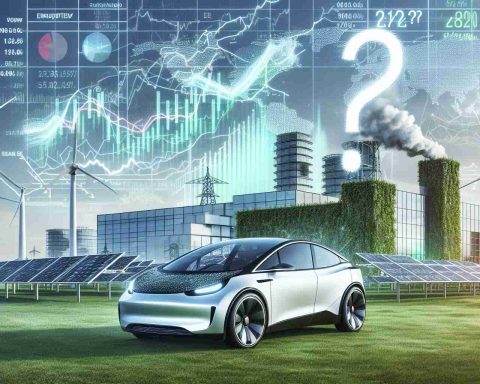In an unprecedented shift, a Chinese electric vehicle manufacturer is now the leading car brand in Singapore, outpacing the long-standing favorite, Toyota. In 2024, BYD (Build Your Dreams) has made headlines by achieving a remarkable feat, selling a staggering 6,191 cars in the city-state.
This achievement reflects a jaw-dropping increase of 337% compared to the prior year, where the company reported sales of just 1,416 vehicles. The dramatic surge highlights not only the growing popularity of electric vehicles but also the changing landscape of consumer preferences in Singapore.
As global interest in sustainable transportation rises, BYD’s state-of-the-art technology and innovative designs have captured the attention of car buyers. The swift rise of BYD positions it at the forefront of the electric vehicle revolution, marking a significant milestone in the automotive industry.
This remarkable growth suggests that consumers are increasingly prioritizing eco-friendly options over traditional vehicles. The shift not only indicates a broader acceptance of electric mobility but also demonstrates BYD’s effective marketing strategies and its commitment to sustainable transport solutions.
This trend could challenge other car manufacturers to adapt, as more consumers embrace the environmental benefits of electric vehicles in their daily lives. As BYD continues to thrive, the future of car sales in Singapore looks set for even more transformation.
Emerging Paradigms in Electric Mobility
The ascent of BYD in Singapore’s automotive market is more than just a corporate triumph; it signals a profound shift in societal values and economic structures. As electric vehicles (EVs) gain traction, traditional automotive giants like Toyota face mounting pressure to innovate. This trend is reflective of a global movement toward sustainable practices, with consumers increasingly aligning their purchasing decisions with environmental consciousness.
Beyond consumer habits, this transition carries significant implications for the global economy. The burgeoning EV market is poised to reshape supply chains, from battery production to renewable energy sources. As nations prioritize green technologies, companies that lag in electrification may find themselves at a competitive disadvantage. By 2030, it is projected that the EV market could represent over 30% of all vehicle sales globally, worth more than $800 billion.
Moreover, the environmental impact of this shift cannot be overstated. Improved air quality, reduced carbon emissions, and diminished dependence on fossil fuels are tangible benefits that resonate across borders. This transformation could catalyze a more extensive commitment to sustainability in various sectors, influencing everything from urban planning to public transport.
As BYD’s success inspires similar initiatives worldwide, the long-term significance of this trend appears poised to redefine not just the automotive landscape but the broader essence of transportation and ecological stewardship.
BYD Overtakes Toyota in Singapore: An Electric Vehicle Revolution Unfolds
Introduction
In a groundbreaking turn of events, Chinese electric vehicle (EV) manufacturer BYD (Build Your Dreams) has emerged as the leading car brand in Singapore. Surpassing the long-time market leader Toyota, BYD achieved remarkable sales figures in 2024, selling 6,191 vehicles—an extraordinary 337% increase from its prior year sales of 1,416 vehicles. This surge is not merely a statistic; it is symptomatic of a broader shift towards electric mobility in Singapore.
Market Analysis
The rapid growth of BYD in Singapore reflects a significant transformation in consumer preferences. As the demand for sustainable transportation rises globally, Singaporean consumers are increasingly opting for electric vehicles over traditional internal combustion engine vehicles. This trend doesn’t just stem from growing environmental awareness but also from improved technological features and design innovations offered by EV manufacturers.
Features of BYD Vehicles
BYD’s ascent can be attributed to several key features that resonate with today’s buyers:
– Cutting-Edge Technology: BYD’s vehicles are equipped with advanced technology, including impressive battery range and efficient charging systems.
– Stylish Design: The aesthetic appeal of BYD vehicles, combined with practicality, attracts a younger demographic looking for both functionality and style.
– Safety Features: Enhanced safety technologies contribute to consumer confidence, making BYD an appealing choice for families and individuals alike.
Pros and Cons of BYD Vehicles
Pros:
– Eco-friendly and sustainable options
– Innovative technology and safety features
– Growing infrastructure for EVs in Singapore
Cons:
– Limited service centers compared to well-established brands
– Initial higher purchase price compared to some traditional vehicles
Use Cases
BYD vehicles are not only suitable for individual users but also for commercial fleets, which are increasingly turning to electric options to reduce operational costs and environmental impact. Companies looking to enhance their corporate responsibility can benefit from integrating BYD EVs into their fleets.
Innovations
BYD is continuously pushing the envelope with innovations like battery technology advancements, aimed at extending battery life and improving charging times. Their commitment to research and development positions them as a frontrunner in the EV space.
Sustainability Impact
The meteoric rise of BYD emphasizes the importance of sustainability in modern car manufacturing. As more consumers embrace electric mobility, the resulting decrease in carbon emissions could significantly benefit Singapore’s urban environment.
Future Predictions
Looking ahead, the trajectory for BYD in Singapore seems promising. With the government fostering initiatives for cleaner transportation and the development of EV infrastructure, BYD’s dominance in the market may signify a shift that encourages other manufacturers to innovate or risk obsolescence.
Conclusion
BYD’s rapid ascent in Singapore’s automotive market demonstrates a pivotal moment for electric vehicles in Southeast Asia. As the landscape continues to evolve, the embrace of eco-conscious options is likely to inspire further innovations in the sector. The expansion of electric mobility is not just reshaping consumer habits but is also playing a crucial role in global sustainability efforts.
For more information on BYD’s innovations and impact on the automotive industry, visit BYD’s official website.













